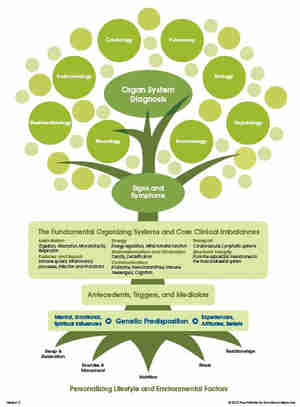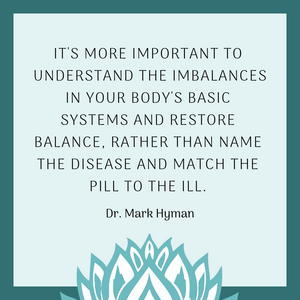Why do we accept that we have no power over our health?
According to the CDC, approximately 50% of American adults are diagnosed with chronic conditions, 73.6% are overweight or obese, 1 in 44 children are diagnosed with autism. And the statistics don’t stop there. Based on the current statistics it seems like we don’t have any say in our health. However, these conditions don’t have to be our fate. We can control our genes through diet and lifestyle to prevent, stop, or reverse health conditions.
How is this possible?
With our current healthcare model and lifestyle choices, we have to actively work to stay healthy, prevent disease, or reverse diagnoses. Our doctors specialize in medical emergencies and disease maintenance, instead of disease prevention. When stress, nutrition, connecting with nature, sleep, and mental health are not talked about in the doctor’s office, it’s no wonder we struggle to feel vibrant and stay healthy. The fundamentals of health and human nature are missing from our health care plans.
To make matters worse, we live in a toxic world. The food we eat has been altered, hosed down with chemicals, and stripped of nutrients. We are bombarded with stress and blue light from screens. We hardly breathe fresh air, feel the sun on our skin, or feel the ground beneath our feet. Our modern world makes it hard to thrive.
A Different Approach
However, when we can reflect on our natural human needs we can look to ancient healing practices and combine them with modern-day solutions to rebalance our bodies so that we are not destined to feel like crap!
Integrative and Functional Medicine takes this natural approach to give you back your power. The core of Functional Nutrition is to assess the WHOLE person. Functional Medicine Dietitians want to know every detail about you- your stress levels, how often you get headaches, where on your face you get pimples, what foods make you bloated…
Although it may not feel like it, these symptoms are little gifts from your body alerting you that something is out of balance. We all need some help listening to what our bodies are trying to say! Your Functional Medicine Practitioner is on your team to decipher these messages and make a unique plan to support your unique body. Practitioners have a deep understanding of the interconnectedness of the body’s systems and can help you understand the why behind your symptoms. Using this approach to identify the root cause of imbalance creates the opportunity for long-term health.

Why Focus on Symptoms Not Diagnoses?
If we look at the Functional Medicine Tree, we see that diagnoses are at the very top of the tree. Often diagnoses only serve to give a name to a collection of symptoms. This can be so frustrating! Once a Gastroenterologist diagnosis you with something like Irritable Bowel Syndrome, or “IBS”, they can only give you the generic IBS recommendations. Naming the symptoms does not allow for individualized treatments. The roots of the tree, the true causes of the symptoms, are hardly addressed after diagnosis. If someone has high blood pressure because of their stressful job, why would treat them the same way as someone who has high blood pressure because of a poor diet?
Functional Medicine Practitioners analyze a person’s symptoms and then move down to understand their roots. We understand how interconnected every system in the body is and how lifestyle and diet influence each part. When we address the true root cause, we can prevent diagnoses and help people feel better who have already been suffering.
Now What?
After understanding the importance of a holistic and patient-centered approach to medicine, how do we actually improve our health and wellbeing?
1. Food
Nutrition is hotly debated amongst and between doctors, dietitians, health coaches, vegans, cross-fit athletes, health podcast junkies, celebrities and your High School friend, Sarah on Instagram. So who is right? Well, if a perfect diet really existed, everyone would be following it already. Unfortunately, there is no one diet that suits us all.
Functional Nutrition uses therapeutic diets during the healing process to provide or eliminate specific compounds and helps form long-lasting nutrition recommendations based on your preferences and body’s needs. Some people’s joints swell up when they eat dairy, others do not. Foods are not inherently bad or good. The goal is to instead find what foods should be emphasized, and what foods should be minimized for your unique needs at your specific location on your health journey.
2. Lifestyle
Emotional trauma, physical injuries, lack of sleep, toxic chemicals in our environment, and demanding jobs all have profound impacts on our health. These stressors change our gene expression, impact our gut health, weaken our immune system, and make our bodies more susceptible to getting out of balance. The goal is to find tangible ways to reduce the stress we put on our bodies. Small lifestyle modifications can have a profound impact on our overall health.
3. Fixing Imbalances in the Body.
To truly restore imbalances in the body, we need to understand what the body needs and what needs to be removed. Imagine a car trying to cross a roadblock. First, we need to make sure the car has gas to drive past the roadblock. But it would also be super helpful to take away the roadblock! Vitamins, minerals, antioxidants, and amino acids are like the gas that makes the car run. Toxins like heavy metals, mold, and pesticides are like the roadblocks.
Functional medicine uses lab work to assess nutrient deficiencies and potentially toxic elements. Then, we fuel the body and remove the roadblock with food, water, lifestyle, and personalized supplement recommendations.
Our current ways are making us and keeping us sick. It’s time to take a truly holistic approach to healing!

Functional Medicine provides the attention to detail and individualization that unfortunately, primary care doctors cannot provide due to time constraints. Want a customized root-cause protocol? Learn more about my services here:
*Source: https://www.ncbi.nlm.nih.gov/pubmed/24742395